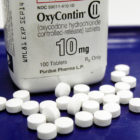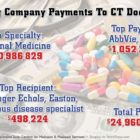I-Team In-Depth
Purdue Pharma Payouts Decline As Fewer Clinicians Report Taking Money
|
Purdue Pharma, in bankruptcy and embroiled in thousands of lawsuits for its role in the opioid crisis, paid Connecticut doctors and nurse practitioners $394,662 in 2018, a slight drop of 9% from $433,246 the prior year, federal data show. But more significantly, the number of doctors and nurse practitioners who reported receiving payments shrunk by 51%, from 204 to 99. “I would assume it was the stigma,” said Dr. Arthur Gale, contributing editor at Missouri Medicine. “You can’t pick up a newspaper and not read about Purdue. Even the greatest promoter of OxyContin and narcotics, Dr. Russell Portenoy, is now saying he was exposed to false information.”
Data from the Centers for Medicare and Medicaid Services (CMS) show that a small group of doctors in Connecticut received the bulk of payments during the two years.

